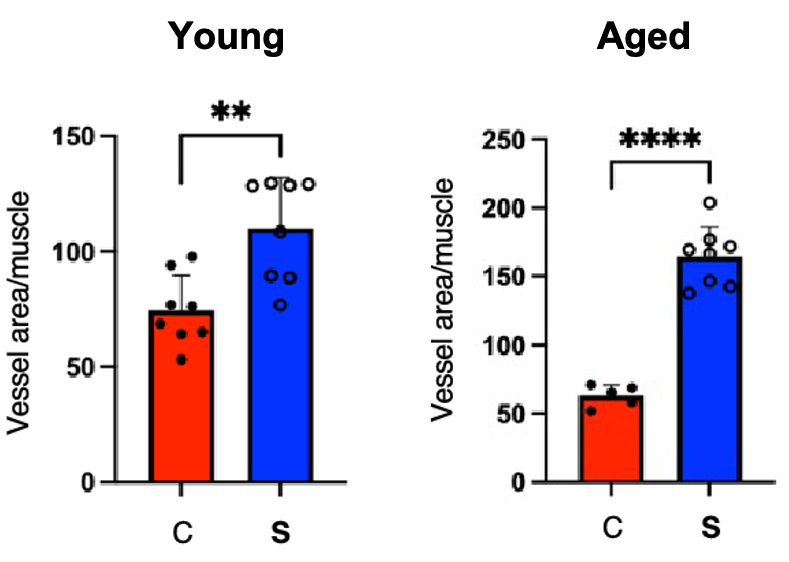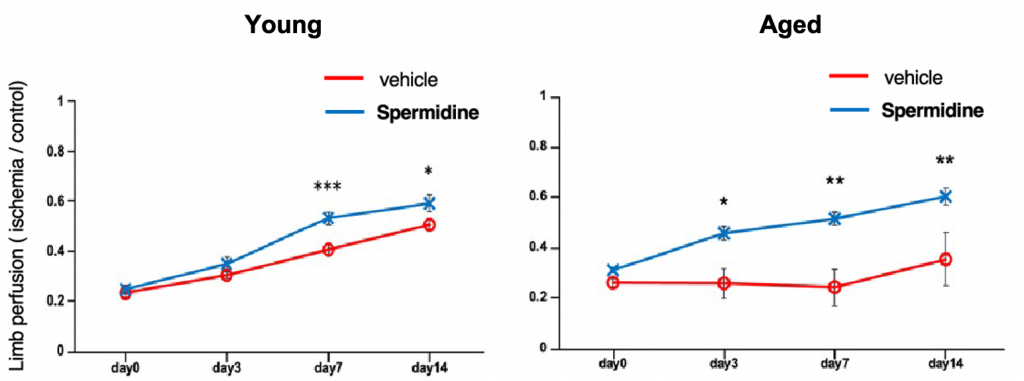Key Points:
- Treating aged (senescent) human blood vessel cells with spermidine promotes blood vessel formation.
- Supplementing aged and young mice with spermidine increases muscle blood vessels.
- Spermidine supplementation increases lower limb blood flow in young and aged mice.
Spermidine, originally isolated from semen, occurs naturally in the body but declines with age — at least for most individuals. Those who live beyond the age of 90 do not experience this decline and have spermidine levels similar to middle-aged adults. Furthermore, studies show spermidine prolongs lifespan, improves cognition, and protects against heart disease in mice.
Now researchers from Kyoto Prefectural University of Medicine in Japan show in Scientific Reports that spermidine improves the capacity of aged (senescent) blood vessel cells to form new vessels. Furthermore, supplementing young and aged mice with spermidine enhances new blood vessel formation and increases blood flow. Since impaired blood vessel growth leads to cardiovascular disease, these findings support spermidine’s cardioprotective effects.
Spermidine Enhances Blood Vessel Growth
Our blood vessels are lined with cells called endothelial cells (ECs), which play a crucial role in blood vessel growth. With aging, many of our cells, including ECs, enter a state of senescence. Senescent cells are dysfunctional, cause inflammation, and may drive the aging process. Thus, senescent ECs can’t effectively organize the formation of new blood vessels.
To determine the effect of spermidine on senescent ECs, Ueno and colleagues treated human senescent ECs with spermidine in a dish (in vitro). This led to an increase in tube junction formation and length, indicators of blood vessel growth capacity. Tube formation was also increased in normal ECs, suggesting that spermidine may also benefit blood vessel growth in young cells.

To test the effect of spermidine on blood vessel growth in mice, Ueno and colleagues placed spermidine in the drinking water of young (10-week) and aged (80-week) mice. Blood vessel growth was induced by cutting off the blood supply to a lower limb. As a result of spermidine supplementation, muscle blood vessel density increased in young, and especially aged mice.

Ueno and colleagues also utilized laser technology to assess blood flow. Spermidine supplementation was shown to improve blood flow recovery in aged mice, while smaller effects were also seen in young mice. These findings suggest that spermidine supplementation can increase new blood vessel growth in both young and aged mice, with greater effects in aged mice.

Spermidine is known to induce autophagy — a process used by our cells to eliminate unwanted material like broken proteins. Ueno and colleagues found that spermidine increased markers for autophagy in both senescent ECs and aged mice. Autophagy plays a key role in blood vessel growth capacity, so these findings suggest that spermidine enhances blood vessel growth via autophagy.
Spermidine: Anti-Aging Compound?
Previous studies have shown that spermidine inhibits tumor growth in mice, reduces brain inflammation and anxiety in rats, and slows liver aging in mice. Even Bryan Johnson, the human longevity experiment, consumes chlorella powder to achieve the anti-aging effects of spermidine. Importantly, the authors point out that,
“In humans, high levels of spermidine intake correlate with improved cognitive performance, reduced blood pressure, lower incidence of cardiovascular disease, and lower all-cause mortality.”
However, the authors also mention that recent clinical trials have failed to confirm spermidine’s effects on improving memory and add,
“In-depth investigation is required before dietary spermidine supplementation can be broadly recommended as an anti-aging supplement. Nevertheless, the lifespan-extending effects of spermidine strongly suggest its gross beneficial properties as an antiaging compound.”
Notably, blood vessel growth is one of the many benefits of exercise. Regular aerobic exercise is known to largely reduce the risks of cardiovascular disease and mortality from cardiovascular aging. New blood vessels also aid in exercise performance, suggesting that spermidine supplementation could potentially do the same.